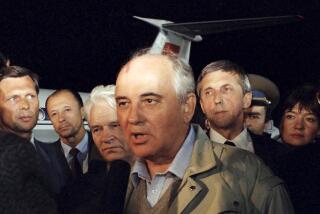Moscow’s Master of Timing : Soviets: Gorbachev plays his cards carefully to stay in power, advance <i> perestroika</i> and bring Boris Yeltsin to heel.
- Share via
Those who have said for four years that Mikhail Gorbachev’s overthrow is imminent, that economic reform has collapsed and that Gorbachev has gone from failure to failure in foreign policy, have been at it again in the last few weeks.
And, instead, as the predictable “compromise” with the republics demonstrates, Gorbachev has been in the process of bringing Boris Yeltsin and the republics to heel, accelerating economic reform and successfully integrating his country into the Western economy and military structure. Gorbachev’s so-called failure in Japan was a crucial move in his domestic chess game.
Why has American analysis been so wrong? Basically it’s because intellectuals lack the great politicians’ sense of timing. As Richard Nixon often said, timing is everything. The trick of successful leadership in politics is to have an understanding of what is possible and when, the ability to create conditions in which you are “forced” to do what you want to do, and enough of a sense of theater to fill the intervening time in a distracting way.
That is what Gorbachev has been doing. His position is not precarious, contrary to what we’ve been reading; his opponents have no politically viable alternative.
The party Central Committee and the army will not support a Boris Yeltsin who abandoned the Communists, and they will not support a conservative who would scare the West into rearmament. The young middle class will not revolt to support a Yeltsin who talks of privatization but is the darling of miners, promising them a continuation of economic subsidies and freedom from unemployment.
None of this is simple good luck for Gorbachev. He has deliberately structured the political environment to have a perceived threat on the left and another on the right; he prevails by being regarded as the lesser evil by both.
Similarly, those who talk about retreat on economic reform are not thinking seriously. The mass of legislation about privatization and property, the accelerating movement of people into the private sector (6 million last year), the imminent passage of a law permitting 100% foreign investment, the necessary step of increasing prices, the development of a system to collect taxes as part of a market infrastructure--how many people expected these two or three years ago?
The policy changes are occurring in conjunction with economic difficulties not only because this is inevitable, but because it is politically necessary. Only if the present seems intolerable will people accept revolutionary economic policy change as the only alternative. But, like the American New Deal, these changes will take decades to be fully implemented.
The key question on the agenda is movement toward a U.S.-style federal system. There is no possibility of foreign and domestic investment without a strong central government that can create a nationwide market and set financial policy. There is also no possibility of such investment without decentralization of much of the decision-making process on privatization, taxation and regulation. Key decisions must be made this spring in order to be incorporated in the planning process for 1992.
Gorbachev’s journey to Japan was delicately timed. Domestically, Japan is an important card in the battle to control Yeltsin. Gorbachev wants investment from Japan, not “aid,” but no responsible corporation would invest in the Soviet Union (at least the Russian part of it) so long as Yeltsin’s Russian Parliament continues to create legal and financial chaos. Gorbachev will say that people such as Yeltsin must stop posturing and allow the Soviet Union to get down to the business of creating a good investment environment.
Fortunately, the Bush Administration has a clear sense of what is going on. Secretary of State James A. Baker III was in Moscow conducting historic negotiations while others thought Gorbachev was being overthrown. Surely it is time for America’s intellectuals to leave the postwar period, too, and help the country adjust to a different world.
More to Read
Sign up for Essential California
The most important California stories and recommendations in your inbox every morning.
You may occasionally receive promotional content from the Los Angeles Times.













